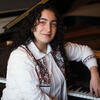What sort of impact do you hope to have in your field?
When you’re an artist, a lot of things get tied together, especially politics. I believe it's impossible to be an artist without having a political stance. I also think that the music industry is starving for science. If you want to be a performer, you have to know the anatomy of your hands, the same as a dancer needs to know the anatomy of their body. It’s important for people in the music industry to understand the connection between sound and science. Music is a beautiful, abstract thing, but we need to remember that sound is science. By using science to guide our intentions with sound, we can create music that has the greatest effect on one’s emotions and psychology. I want more people in the music industry to think about that.
How do you find community at Temple?
Coming to Temple was like finding a family that I felt a lack of upon my immigration. Philadelphia is a diverse city, but it can be frightening for an immigrant who doesn’t have a big community of their own in the city. There were not many Iranian students at Temple when I started, but the community has grown a lot since then. I also love how all the professors and students in the music department at Temple really seem to care about and value mental health, culture, politics, and sociological thought.
What advice do you have for potential grad students at Temple?
Don’t come to grad school just because you want a degree. Come if you feel like you really want to learn something, and don’t assume you know exactly what your path will look like, because everything can change!


